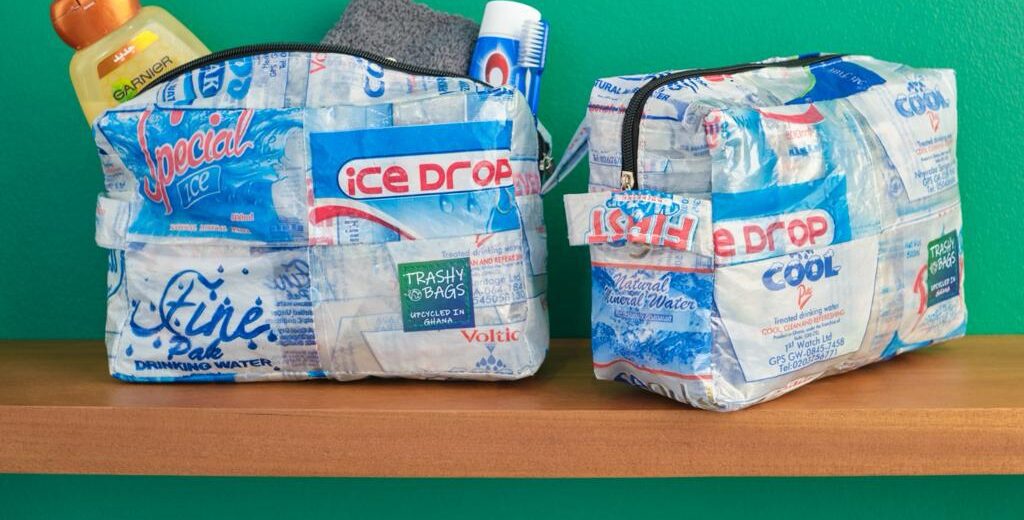
The Hidden Treasure in Plastic Waste
A recent upcycling project in Ghana has impacted over five thousand underprivileged students by repurposing water sachets into reusable materials and products. Through donations of upcycled items, the initiative is educating students on the importance of reducing plastic waste and encouraging them to become ambassadors for upcycling. By incentivizing participation and rewarding contributions, the project is empowering these young ones to actively engage in waste reduction efforts, turning them into stakeholders for environmental sustainability. One of the easiest ways to reduce waste is to reduce your consumption.
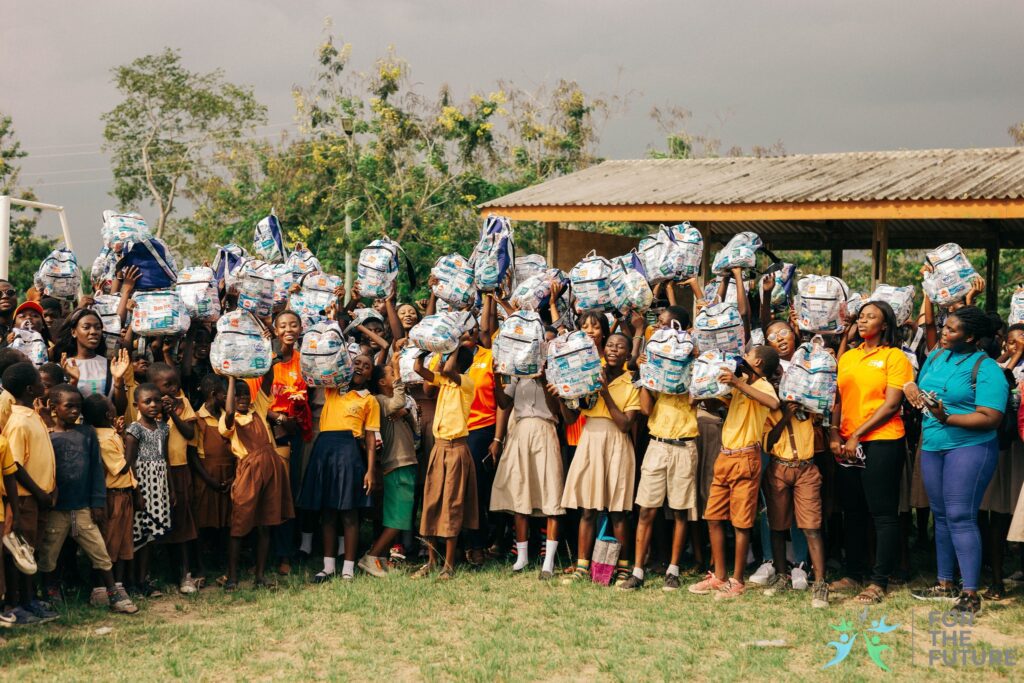
Through donations of these upcycled bags, children are made mini ambassadors. Photo Credits: For the future
Upcycling is the practice of creating a usable product from waste or unwanted items or adapting an existing product in some way to add value. The purpose of upcycling is to reduce waste and improve the lifespan of the resources used. Upcycling benefits the environment by reducing the pollutants of air, land and water in the processing of new goods – as well as preventing additional natural resources from being used. It also reduces the amount of excess waste which would otherwise end up in landfills.
The race to zero waste
Have you noticed that each and every passing day, the world has become a little unbearable to live in? I mean beyond the economic crises, onto the climate crisis. From the air we breathe, through to the oceans, everything seems polluted. The beauty of this earth, from land to ocean, is covered in waste. To the extent that scientists are researching on different planets other than earth, that can serve as a second home for the human race.
There are indeed current policies in place to help curb this climate crisis. Yes, aside the research on moving humans to another planet, United Nations introduced seventeen Sustainable Development Goals and designated one, Goal 13, to taking action against the further destruction of the earth. As part this, they have set aside the 30th of March as the international day of zero waste which is aimed at promoting sustainable consumption and production patterns.
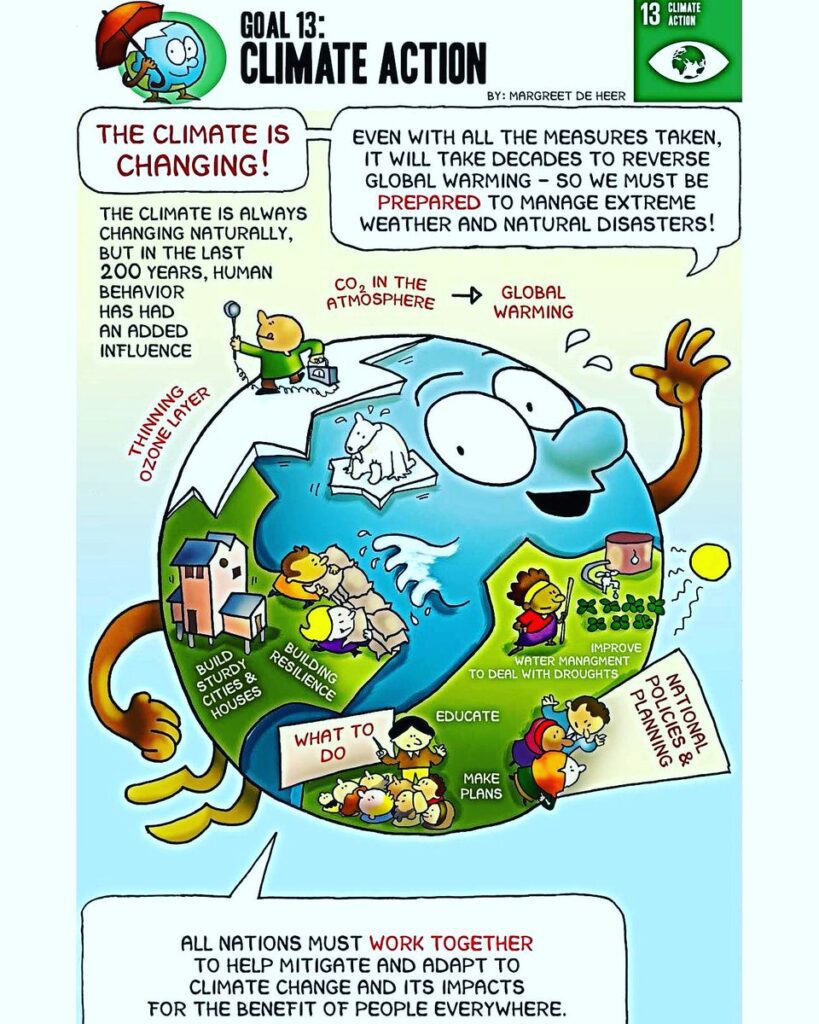
We must all take action against the further destruction of the earth. Photo Credit: Mohammad Siraj on X
To join in this observance day, I decided to spend some time researching about waste management in Ghana and what measures we already have in place to reach the “Net Zero” Climate initiative. Read on to find my deductions.
Plastic Pollution in Ghana
Plastic waste has become one of the most pressing environmental problems of our time, with its pervasive presence in landfills, oceans and communities worldwide.
In Ghana, one of the biggest and most used products of plastics is the sachets used to package drinking water. The United Nations Environment Program reports that an estimated 8.2 billion sachets of water are consumed in Ghana yearly. As a Ghanaian, I can attest to the fact that it is very common for drinking water to be sold in plastic sachets. But you know what is equally common, seeing these water sachets improperly disposed of. Therefore, I was not surprised to see the UNEP report stating that: Eighty-Six percent (86%) of Ghana’s plastic waste is improperly disposed.

It is common for drinking water to be sold in plastic sachets. Photo Credits: Packaging Strategies.
In 2015, Ghana implemented a ban on lightweight plastic bags to reduce their consumption and encourage the use of alternatives. Enforcement of the ban has been inconsistent, and plastic bags are still widely available and used.
That begs the question: What do we do now? Should we completely blot out the usage of plastics or is there a way for us get more from the already produced yet wasted plastic?
An innovative approach to upcycling
In the midst of the challenges posed by plastic pollution in Ghana, an entrepreneur has emerged in the fight against this environmental scourge. Mr. Stuart Gold, through his innovative approach, has found a way to tackle plastic waste by transforming water sachets into useful products for everyday use.
The initiative is not only ingenious but also addresses a pressing need in the Ghanaian society. Water sachets, often used as a convenient and affordable source of drinking water, contribute significantly to plastic pollution due to their single-use nature.
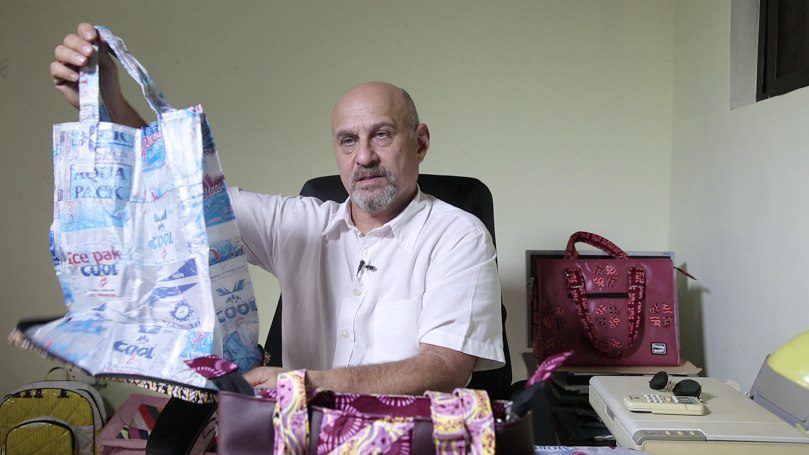
Mr. Gold endeavored to repurpose water sachets into useful products. Photo Credit: Pulse Ghana
These sachets are commonly discarded after use, leading to the accumulation of plastic waste in communities across the country. Recognizing the detrimental impact of plastic pollution on the environment and public health, Mr. Gold saw an opportunity to turn this waste into a valuable resource. By repurposing water sachets, he creates bags and other materials that serve practical purposes in daily life. This innovative approach not only helps reduce the amount of plastic waste entering the environment but also provides economic opportunities for local communities. By collecting and processing water sachets, he creates employment opportunities and generates income for individuals involved in the recycling process.
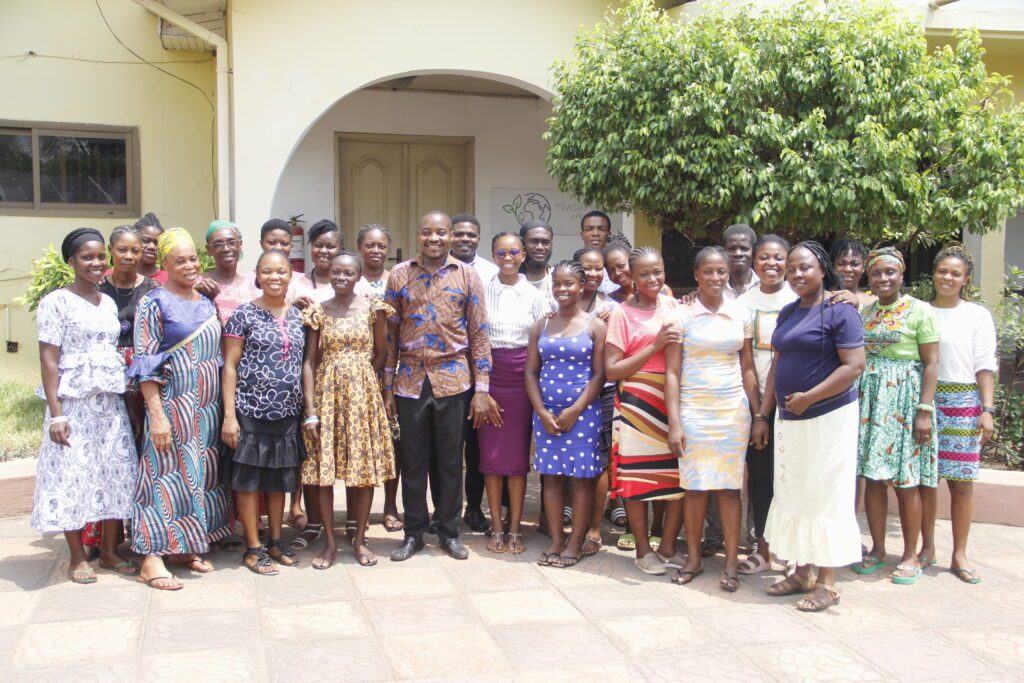
The initiative has created employment and income generation opportunities.
He has been operating an upcycling facility he founded here in Ghana since 2007. The company was birthed out of the need to salvage the issues generated from plastic waste. He says he is being driven by the decision to see these water sachets not as waste, but as a valuable treasure.
To find out more about this initiative, I visited the production hub of this upcycling project to familiarize myself with the activities.
Unfortunately, I did not get the opportunity to have a sit-down conversation with Mr. Gold as he is fully retired from the company. All the same, I was welcomed by Mr. Elvis Aboluah, who is the Factory Manager for the company, Trashy Bags Africa. He was more than happy to take me on a tour and showed me the process through which they gather and upcycle plastic waste.
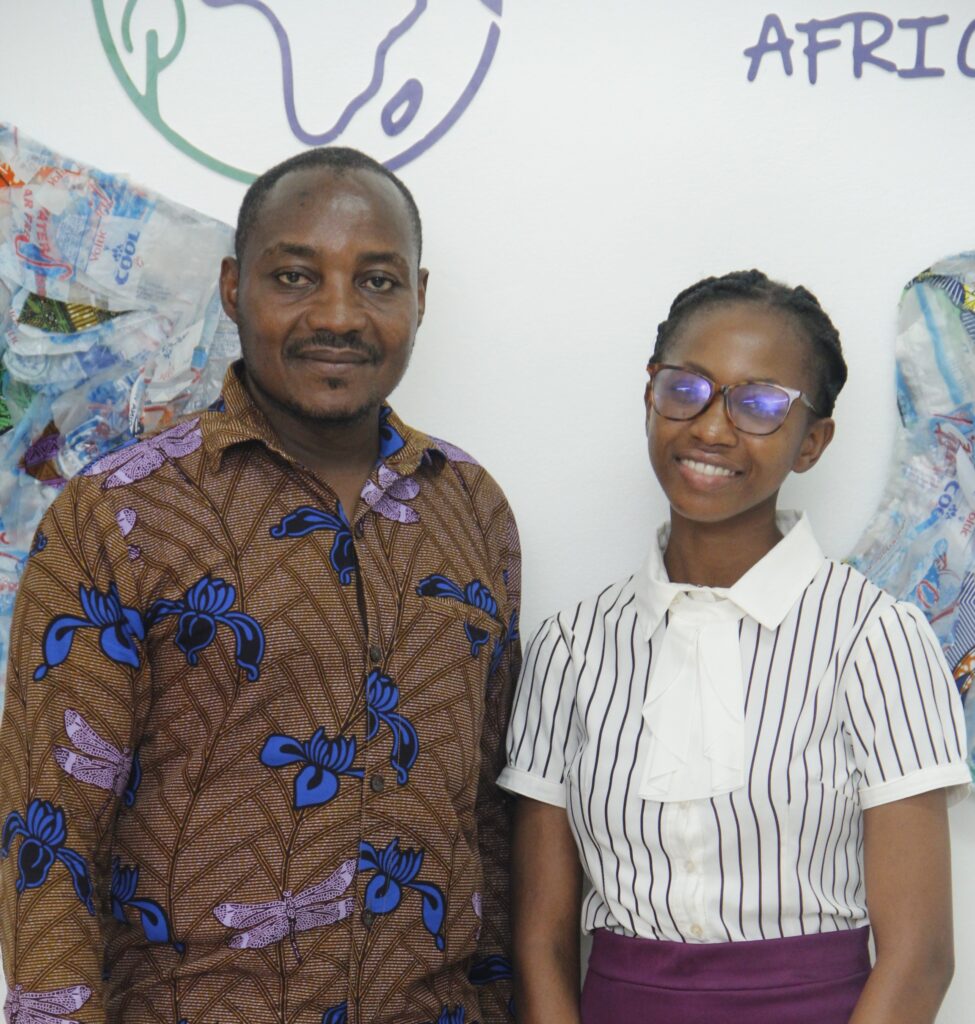
Mr. Elvis Aboluah welcomed Ms. Mary Awah to the production hub.
The Upcycling Process
There are three major stages involved in turning waste into a treasurable item. “Activities under every stage is carefully laid out because we do not want to create another environmental problem while transforming the already gathered waste.”– Elvis Stated
The Collection stage is the first most crucial stage. In a month, nearly 200,000 plastic water sachets are collected. He noted that offcut pieces of fabric, banners and worn-out discarded denim jeans are also gathered. When these wastes are collected, they are taken through a sorting process where they are marked and cut, ready for the washing stage.
Processes involved in Upcycling: The Collection and Sorting stage.
The Washing stage is in three folds: the first is to wash with ordinary liquid soap, the next is to use disinfectants, then wash with the liquid soap for the last time, rinse and then dry them under the Sun.
Processes involved in Upcycling: The washing stage.
After the waste is completely dried, the last and most daunting stage is to turn the recycled materials into the fashionable products. “Doing this requires a necessary skill, so we make sure that our employees are taken through rigorous training so they can produce the expected results” – Elvis Added. It involves sowing the pieces of materials together, according to the sketched designs, to get the intended end product. When this process is complete, the finished products are beautifully displayed in their showroom.
Processes involved in Upcycling: The making of an upcycled bag.
Overturning the Impacts from Waste
This innovative approach to upcycling waste materials has surely overturned the negative impacts derived from waste. It has instead paved opportunities for the implementation of other UN SDG Goals like the Goal 8, decent work and economic growth, plus the Goal 17 which encourages creating Partnership for the goal at hand. Let us take a moment to relish in the impact of this initiative.
Decent Work
Sly Acheampong, is a designer who once aspired to pursue a career in sports, specifically Football. He heard about the initiative to gather and upcycle water sachets, took a chance to divert his career aspiration and joined the newly established team of upcycling. He had zero knowledge and experience in sowing but started with the very basics, marking and cutting the pieces of fabric they had collected. Through this time, Sylvester realized he has passion for designing. Given the opportunity, he nurtured that passion and has designed over Five Hundred bags within the last Fifteen years.
Sylvester, as part of his duties, has had the opportunity to share his knowledge by equipping other young novices through on the job trainings. He testifies to the efforts set in motion to promote job creation, create equal opportunities and continuous learning techniques which forms part of the UN SDG Goal 8 specifically addressing Target 8.3, promoting policies to support job creation, and Target 8.6, promoting youth employment, education and training.
Upcycling has opened doors for employment.
Partnership for the Goals
In collaboration with School in a Bag, over Five Thousand less privileged students in Ghana have benefited from this project. By donating some of these upcycled products to these children, they are creating awareness by educating them on the role they can play to reduce plastic waste. To make them mini ambassadors of upcycling, these children are challenged to gather as much plastic waste (water sachets) as they can and present them to facilitate the up-cycling project. Of course, these children get a reward for contributing to the reduction of waste because they become mini stakeholders for the organization.
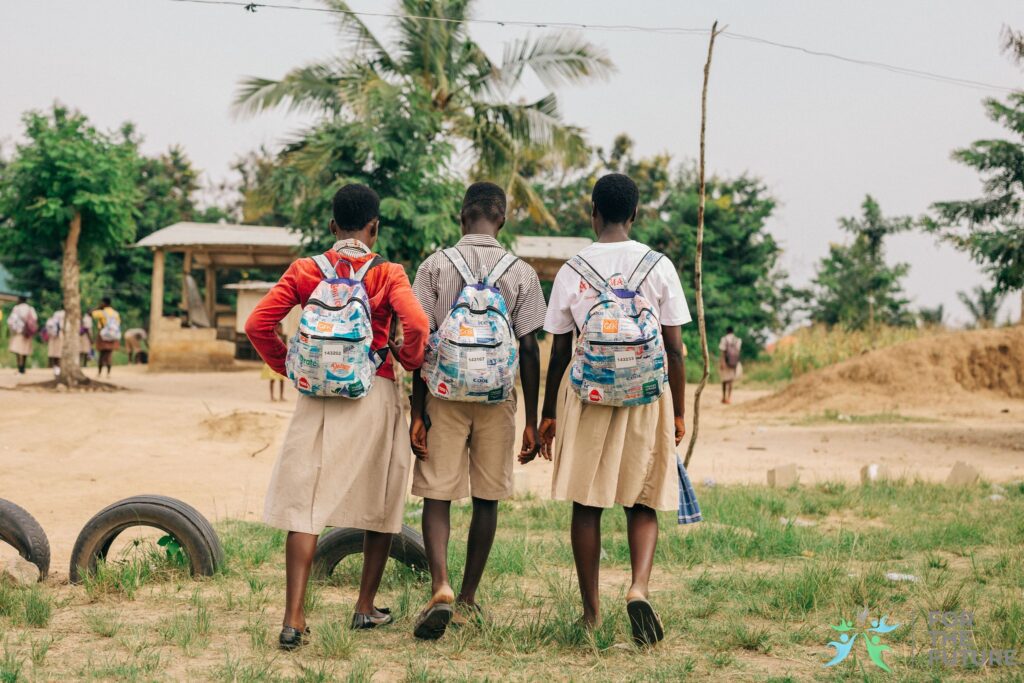
Children are made mini ambassadors to combat plastic pollution. Photo Credit: For the future
Sustainable waste management
I know the question you have in mind? What happens when the product gets damaged and what is the lifespan of these bags? The minimum life span of these upcycled products is ten (10) years. And should these product gets damaged; all you need to do is to bring it to the factory for it to be upcycled into another product or get it patched so you can use it again. This practice of never-ending upcycling promotes sustainable waste management.
Conclusion
On Friday, 15th March 2024, after attending a Food Waste Action event, the Vice Versa Media Ghana team, led by the Country Coordinator, Naana Yaa Boatemaa Asiedu-Asante, felt inspired and immediately decided to activate a two-week campaign on Waste and Sustainability Management using media to raise awareness. The Campaign which aimed at educating the public on the best practices of reducing improper disposal of waste launched on the 24th of March and ends on 30th March 2024.
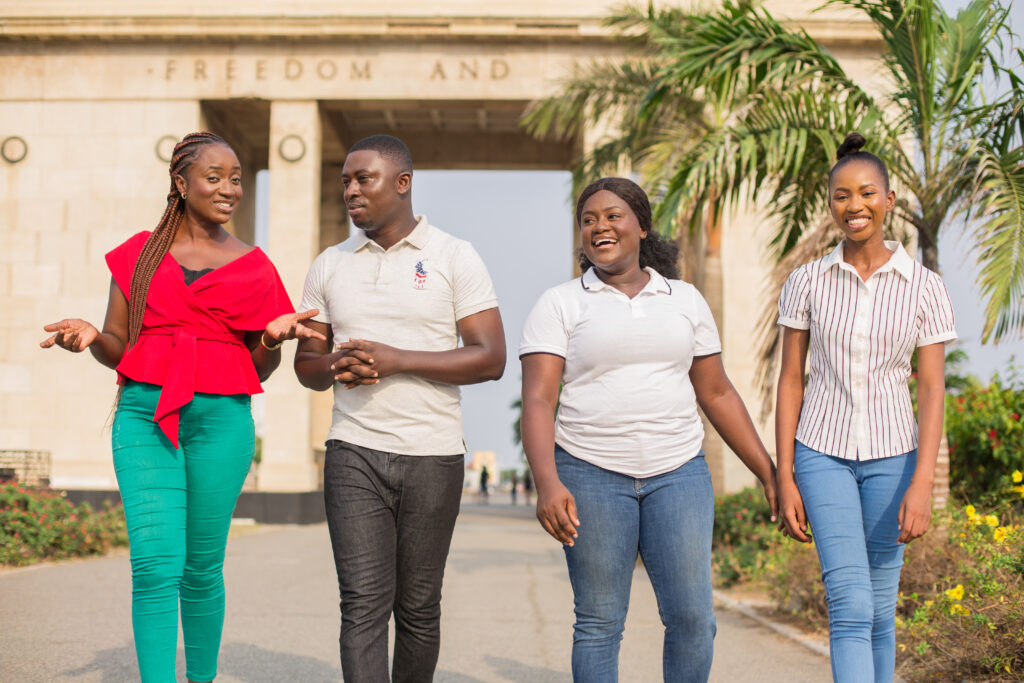
Vice Versa Media Ghana is committed to educating the public on the best practices to reducing improper disposal of waste.
We are committed to not only telling inspiring stories of what people are doing but being in the driver seat of change. At that, we invite you to join us in taking urgent action to combat climate change and its impacts as according to the UN SDG Goal 13. Be ambassadors and start by gathering the plastic waste in your offices, schools and homes and present them to impact millions of young people in Africa. Our doors are also open to anyone who needs help in implementing social media concepts to raise awareness.
-
WORLD PRESS FREEDOM: A PRESS FOR THE PLANET – Vice Versa Global
03.05.2024[…] The Hidden Treasure in Plastic Waste […]

Leave a Reply